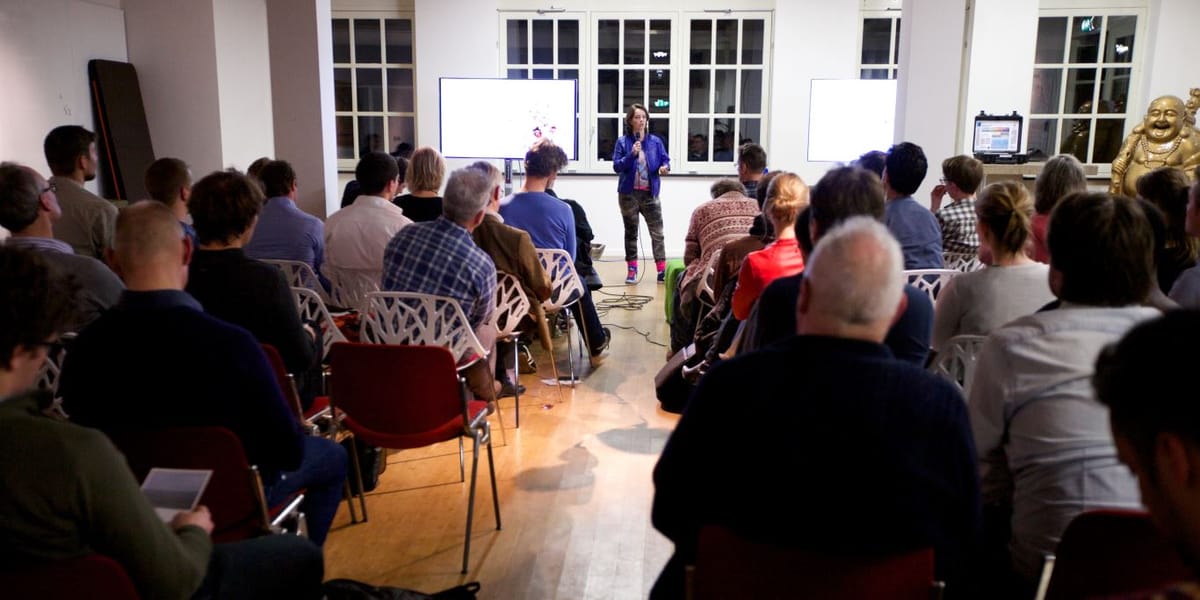How to Get Most out of Meetups and Conferences

Photo by Sebastiaan ter Burg, Quantified Self meetup presentation CC BY 2.0
Everyone has a slightly different goal when attending conferences and meetups. An attendee might want to strengthen niche skills or learn about other fields. If learning is the goal, why not just reserve a day at home to watch the conference recordings after they have been released? I think we don't do that because we're social animals, no matter how introverted we are, we want to be with like-minded people. For some of us, including myself, engaging people isn't always easy. As a white guy, I am part of the majority, and it still isn't easy. I can only imagine what it is like as a minority.
My first meetups and conferences
Let's take meetups as an example. Going to a meetup with a friend is easy: there is someone to talk to between presentations. But what is the benefit of talking to someone you already know? You can watch the video (if the conference was recorded) and have coffee with your friend later.
Of course, talking with a friend from time to time is valuable and will strengthen your friendship, but it doesn't offer new opportunities or as much to learn as new people can offer.
When my friend could not make it to meetups, I decided to go alone when the topic was interesting. Being alone wasn't always a pleasant experience, especially during breaks. Starting conversations with strangers was tough.
The quality of talks at meetups varies a lot, and sometimes you don't gain anything from the meetup: no information and no interesting hallway discussions.
Why is it hard to talk to strangers?
Maybe this isn't a problem in some cultures, but we're a bit reserved here in Finland. We tend to over-analyze what people will think of us if we talk to them. Not knowing how other people will react is frightening.
Fear itself is natural, but the key is to separate truly dangerous situations (base jumping) from uncomfortable situations (talking to a fellow developer). There is no reason to fear saying something silly.
Talking to other people is difficult in some situations. If there are people that already know each other (colleagues, for example), then they may be discussing something related to their work. The group may be so engrossed in the subject that they don't realize that someone else would like to participate.
Tips on engaging people
Let's assume that the first presentation is over and you're on a coffee break. You might normally fiddle with your mobile phone until the break is over. Instead, try going up to someone and asking what she/he thought about the talk. I guarantee, that the person you ask will be thrilled that someone started a conversation! Recipient of the question may even seem to have expected the conversation to avoid spending time fiddling his/hers mobile phone.
Like I said earlier, we don't go to these events solely for information, but to interact with each other as well.
You may want to talk to a particular person, perhaps the chief technical officer of a company you would like to work at. In that case, you should remember to play the long game.
What is a long game? Tim Ferriss gave a great talk with tips on getting the most out of the SXSW (South by Southwest®), and he also talked about playing the long game.
"Playing the long game" means that you don't rush and say whatever you want to say; instead, you're genuinely interested in what the person and the company are all about. Perhaps you don't even speak to your target directly but get introduced by an employee you happen to know.
Each participant is equally valuable: if a junior developer, for example, wants to talk, you don't leave the conversation just because a more experienced person is in the room. There is no need to be a douchebag.
Meetups are listed on meetup.com (or by similar services), along with a short description of each participant. You can always check out what people are doing and what they're interested in, then use that information to start a discussion. For example: "Hi! Sorry to disturb you, but I noticed on your meetup.com profile that you're interested in analog synthesizers. What kind of setup do you have?"
To summarize:
- It is okay to be afraid, but recognize when fear is helpful and when it is a false alarm.
- Everyone in the room is valuable; don't dismiss one person because of another.
- Don't be rude; play the long game.
- Check the information participant has published on their meetup profile page, it is added there for a reason.
Socializing in meetups and conferences has provided plenty of compelling opportunities, and I can imagine the benefits of giving talks given that this type of participation is so rewarding.
I hope these ideas will help you get more out of events!
